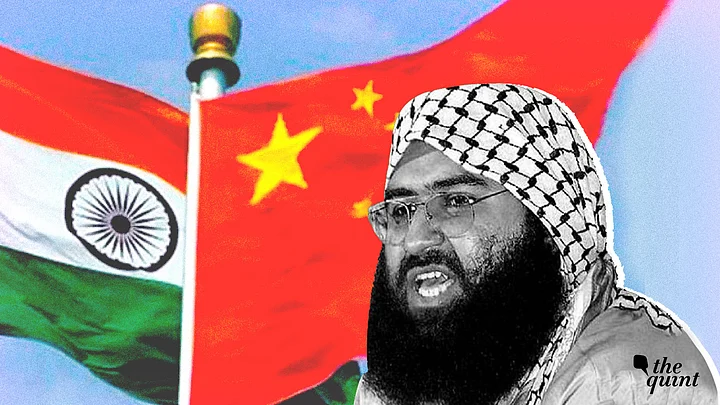India, on Thursday, 2 May, downplayed the absence of any reference to the Pulwama terror attack in the UN notification designating Jaish-e-Mohammed chief Masood Azhar as a global terrorist, asserting that it broadly covered all his terrorist acts.
External Affairs Ministry Spokesperson Raveesh Kumar said the UN notification was not supposed to be Azhar's biodata, insisting that the Pulwama attack played a role in his listing.
Meanwhile, in a statement dated Wednesday, Pakistan issued an official order to freeze Azhar’s assets and impose a travel ban on the JeM chief after his designation as ‘global terrorist’ by the UN.
In a huge diplomatic win for India, the United Nations on Wednesday, 1 May, designated the Pakistan-based Jaish-e-Mohammed chief a global terrorist after China lifted its hold on a proposal to blacklist him under the Security Council's Sanctions Committee .
- China had blocked Azhar’s listing in 2009, 2016, 2017 and 2019
- Azhar’s JeM claimed the terror attack on CRPF troops on 14 February in J&K’s Pulwama
- FM Arun Jaitley hailed the decision and said India stands vindicated
- UNSC designation will subject Azhar to an assets freeze, travel ban and an arms embargo
(At The Quint, we question everything. Play an active role in shaping our journalism by becoming a member today.)
India Gives Clarion Call at UN to Adopt CCIT After Azhar Blacklisting
India, close on the heels of getting Pakistan-based JeM chief Masood Azhar blacklisted, has given a clarion call at the UN for strengthening efforts to adopt the long-pending global convention on international terrorism amidst increasing terror attacks on places of worship across the globe.
India proposed a draft document on the Comprehensive Convention on International Terrorism (CCIT) at the UN in 1986 but it has not been implemented as there is no unanimity on the definition of terrorism among the member states.
India's Permanent Representative to the UN Ambassador Syed Akbaruddin, speaking at a solemn commemorative event for victims of the Easter Sunday attacks in Sri Lanka, said the early adoption of the global framework to combat terrorism will be a "tribute" to those killed and injured in the "barbaric and cowardly" terror attacks in the island nation last month.
Azhar Now Finding Things Difficult in Pak: PM Modi
Prime Minister Narendra Modi, while addressing a campaign rally in Karauli, Rajasthan, said after the UNSC’s sanction of JeM chief Masood Azhar, the terrorist leader was finding things difficult in Pakistan.
“Two days back, a major enemy of India, terrorist leader Masood Azhar was designated a global terrorist. This terrorist leader, sitting in Pakistan, was giving India injuries after injuries,” Modi said.
“Several brave mothers of Rajasthan lost their brave sons while they attacked such terrorists but now this terrorist is finding it difficult to enjoy in Pakistan. Surgical strike, air strike and now this major international strike on intentions of Pakistan, terrorists and terrorist leaders,” he added.
Pakistan Uses 'Terrorism as Tool' Against India: Former CIA Director
Pakistan, obsessed with India as a perceived existential threat, has "created terrorist groups to be a tool" in its struggle against India, a former top American spymaster has said, as per PTI.
Former CIA acting director Michael Morell, in a podcast discussion with Kurt Campbell and Rich Verma on Thursday, alleged that Pakistan is one of the most dangerous countries in the world.
Pakistan has "created terrorist groups to be a tool" in their struggle against India, Morell said.
India Silence on China’s BRI Helped Seal Azhar Deal: Report
UNSC’s decision to list JeM chief Masood Azhar as a global terrorist was sealed about 10 days ago, just before the Belt and Road Forum in Beijing, after weeks of hectic and keenly fought closed-door negotiations, The Indian Express reported..
Much of the diplomatic negotiations took place in New York, while Washington, Delhi, Beijing, Paris, London and Islamabad were in the loop, officials from at least six countries involved in the discussions told the national daily. “It was a multilateral game played at a subterranean level,” a top source said, explaining the complex web of give-and-takes involved.
The report said that Beijing had subsequently conveyed Pakistan’s five pre-conditions to Delhi: De-escalate the situation; start bilateral dialogue; don’t link the Pulwama attack to Azhar’s listing; don’t push, along with the US, for more listings of other individuals and groups in Pakistan; and, stop violence in Kashmir.
